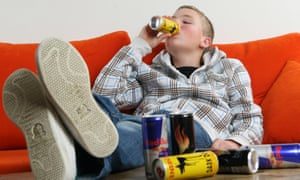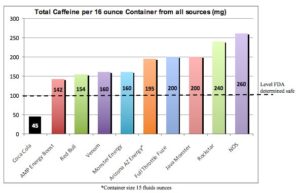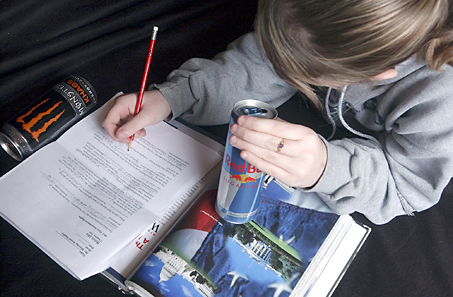Energy Drinks & Kids: The Fizz & The Facts
By: Sarah DoBroka Cooley, Physical Therapist
 MARKETING MAGIC!
MARKETING MAGIC!
Energy drinks are popular beverages that contain caffeine, taurine, vitamins, herbal supplements, and sugar or sweeteners. They come packaged in loud, creatively designed cans and have cool names like Monster, Rockstar, Red Bull, AMP, Full Throttle, NOS, and 5-hour Energy, to name a few. They are marketed to improve energy, stamina, concentration, weight loss and even athletic performance. If I were a kid and had to choose between a clear bottle of water or a can that looked like Wolverine himself slashed through it, there would be no competition! These brilliant marketing efforts have produced results that show greater than 30% of children aged 12-17 regularly consume energy drinks.
 BUT WHAT DO THE EXPERTS SAY?
BUT WHAT DO THE EXPERTS SAY?
The American Academy of Pediatrics (AAP) concludes that energy drinks have NO place in the diets of children and recommend against the consumption of energy drinks. They further recommend that children between the ages of 12-18 years old should consume no more than 100 mg of caffeine daily. That’s about the equivalent of 1 cup of coffee. The National Federation of State High School Associations agree with the AAP and recommend that young athletes should not use energy drinks for hydration, and that information about potential risks should be widely distributed to young athletes.
WHAT ARE THE RISKS?
Unlike sports drinks, energy drinks are considered a dietary supplement, and therefore have no FDA regulations. The safety and effectiveness of the ingredients are also understudied in children. We do know that the average energy drink has more caffeine in one can than the recommended amount for kids. Too much caffeine can cause anxiety, jitters, nervousness, headaches, upset stomach, trouble concentrating and sleeping. More serious cardiac and neurological symptoms can be irregular heartbeat, increased blood pressure, seizures or hallucinations. Children with pre-existing health or behavioral disorders may be at higher risk for adverse effects from energy drinks.
WHAT CAN BE DONE?
Despite data and professionals describing the potential harmful risks, there is currently no legislation in the United States preventing kids from purchasing energy drinks. Parents, health professionals, school systems and coaches need to stay educated, advocate for the reduction of marketing towards kids and product availability, and encourage kids to SKIP THE ENERGY DRINKS! Kids can improve their grades and game with hard work, exercise, and practice. Water is sufficient for most kids to stay hydrated, and sports drinks are appropriate if they exercise for long periods of time or in hot weather.

Sarah DoBroka Cooley PT, SCS, COMT, Cert DN has greater than 17 years of clinical experience and highly respected credentials including being a Board Certified Sports Clinical Specialist, a Certified Manual Therapist, and certifications in dry needling and instrument assisted manual therapy. She specializes in treating orthopedic injuries in athletes who compete on interscholastic, collegiate, Olympic, and professional levels. Locally, she has served as a PT consultant to Davidson College and was a member of the Motorsports Outreach Team for NASCAR. Contact her at sarah@charlotteoneononept.com.


